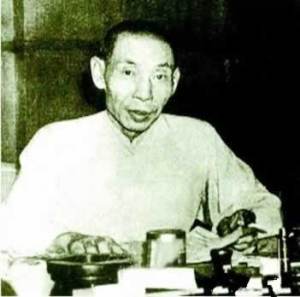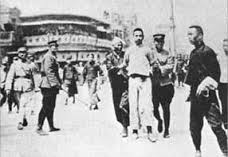Triads, Gangs, Thugs and Chinese Politics – We’ve Been Here Before
Posted: October 17th, 2014 | 1 Comment »The apparent appearance of hired thugs, probably from Guangdong organised crime gangs, on the streets of Hong Kong harassing the democracy movement has been blamed on the Mainland Chinese government’s tendency to use such people to stir up trouble and chaos at everything from property development disputes (beating residents slow to leave) to labour strikes (beating up workers) in recent years. As well as a rather handy non-uniformed enforcement body, the thugs provide the government with the opportunity to claim divisions within society and justify the need for state forces to step in to stop the chaos. Some in the foreign media and casual observers have found this tactic hard to understand and difficult to countenance. However, there is a long history of China’s post-1911 governments using triads, gangs and hired thugs to intervene and either stir up, or repress, volatile situations and deal with perceived “enemies” of the state. The roots of the triads and other secret societies mostly reach back anti-Qing organisations, but we don’t need to go quite that far back…
So let’s go back to 1927….and Shanghai….
To cut a long story short (Chinese history stories are always long of course) Chiang Kai-shek, at the end of his Northern Expedition, wished to purge Shanghai of communists, leftists and unions. He needed help in the International Settlement and Frenchtown where his troops could not freely roam (as the PLA cannot in Hong Kong). The Green Gang and Red Gang offered to help. In April 1927 hundreds of left wing activists (some say over a thousand – the sources are confused to say the least – Edgar Snow claimed between 5,000 and 10,000 people were executed, but he had his own agenda as we all know) were killed, mostly by Green and Red Gang members wearing overalls and white armbands saying “worker”. They were hunted down and either shot or beheaded in the street, snipers shot more from rooftops.
Nobody came out of the events of April 1927 well. The deal to suppress the Left involved all the major players in Shanghai. Du Yuesheng, the Green Gang leader, organised his own militia – the China Mutual Progress Association – while the French Consul General called for a public struggle against the communists with French police guarding the headquarters of Du’s Association and supplying them with guns. Du then used his contacts with Captain Fiori, the Frenchtown Chief of Police, to meet with Sterling Fessenden, the Chairman of the Shanghai Municipal Council (SMC) in the International Settlement. Fessenden, a short, plump American, persuaded the SMC to allow Du’s thugs passage through the International Settlement so they could slaughter the Leftists. Probably like today’s Communist Party politicians in Beijing, Chiang would have liked to think either of the gangs as (misguided) patriots to be worked with to do a good thing or as thugs he temporarily had to work with to achieve the right ends. However, the truth was that the nationalist’s links with the Green Gang went back to the founding of the Republic when Dr Sun’s confidant Chen Qimei had enlisted Green Gang support to seize Shanghai for the nationalist cause.
The problem in 1927, and one presumably the Party in Beijing will have to deal with now in southern China, is what price the gangs extract for their services? In 1927 political insiders were not that surprised that the first civilian visitor to see Chiang in Shanghai after the putting down of the left was Huang Jinrong, the boss of the Red Gang. A deal had been done – the gangsters would back Chiang with thugs and arms in return for immunity and continued control of Shanghai’s lucrative drugs business. The government’s deal with the thugs was not necessarily much of a secret – consider a Secret General Staff Intelligence Report, Shanghai entitled ‘Chinese Secret Societies and Political Organisations’ from March 1937 (which anyone can read at the UK National Archives by calling up file WO 106/5375):
‘It is generally believed that in exchange for assistance rendered to him, General Chiang promised the Green Party in Shanghai a monopoly of the opium business, and it was not long before the party enjoyed the reputation of a gang of racketeers whose activities were on a par with those of their Chicago counterparts – the Capone gang. Nothing of importance happened in Shanghai in which could not be found the influence of the Green Party, workers organisations and labour unions being completely under its domination.’
 Du Yuesheng – Gang leader who hired out thugs to the government – but not without a price
Du Yuesheng – Gang leader who hired out thugs to the government – but not without a price
Of course later many of the thugs who cut their teeth in 1927 became even more formally politically aligned. After Du Yuesheng left Shanghai in 1938 (following the Japanese invasion) and headed to Hong Kong and Chongqing the Green Gang’s power collapsed in the city. Du eventually died in Hong Kong after time in Taiwan after 1949. With the Green Gang effectively neutered in Shanghai after 1938 many of his thugs moved effortlessly into the ranks of collaborator Wang Jing-wei’s puppet pro-Japanese government where they continued to operate as thugs, extortioners and murderers. After the war the Kuomintang government faced with weakened ranks after fighting the Japanese and the insurgent communist threat made contact again with those remnants of the old Green and Red gang as well as other gangs – the KMT in Shanghai in 1946 reactivated their branch of the Ang Bin Hoey and Hung League secret societies in order to fight the communists.
When current events in Hong Kong finally play out and the gangs and thugs are told to return to their lairs in Mongkok, or across the border in Guangdong, what price will they exact for their “loyalty” during these times?

![shanghai-1927-beheading[1]](http://www.chinarhyming.com/wp-content/uploads/2014/10/shanghai-1927-beheading1-300x159.jpg)
Paul,
Thank you for this background. I very much appreciate your blog for the way it focuses intelligently on China from multiple perspectives. While China is not my primary research focus, I find here many parallels to my interests: Europe in the interwar (and WWII) years, and Jane Austen, particularly her relationship to imperialism. I also enjoyed your post on Vicki Baum–I recently read her Grand Hotel, but was not aware of the Shanghai book.